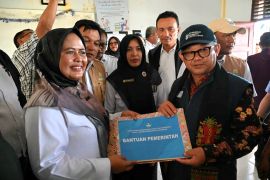People can get zoonotic diseases from contact with infected live poultry, rodents, reptiles, amphibians, insects, and other domestic and wild animals.Jakarta (ANTARA News) - World Zoonoses Day is observed on July 6 every year to emphasize and bring public awareness of the problem and teach people to take right actions to prevent themselves from more than 200 zoonotic diseases which are known to exist.
People can get zoonotic diseases from contact with infected live poultry, rodents, reptiles, amphibians, insects, and other domestic and wild animals.
A common way for these diseases to spread is through the bite of a mosquito or tick. People can get diseases in most places where they might have contact with infected animals and insects.
The most common zoonotic diseases are among other things rabies, plague of insects, tuberculosis, cat scratch fever, tick paralysis, ringworm, salmonellosis, leptospirosis, cCryptosporidium infection, scabies, and many more.
Wildlife serves as a reservoir for many diseases common to domestic animals and humans, and people working with wildlife should be alert to the potential for disease transmission from animals.
Neither animal handlers nor the general public have reason to be alarmed or frightened but everyone should respect the potential for disease transmission and use sound preventive measures.
Generally, disease can be easily prevented than treated, and nowadays, there is effective prevention through advance measures in medical science and vaccination.
In addition, there are many practical things that people can do to protect themselves and your their family members from zoonotic diseases.
Celebrating the World Zoonosis Day on Thursday, the Dean of the
the Faculty of Veterinary Medicine of Bogor Agricultural Institute (IPB), Prof Srihadi Agung Priyono, reminded the public to maintain personal hygiene and environment in order to avoid the zoonotic illnesses.
"In general, zoonotic diseases can be prevented with preventive measures that can be done such as maintaining cleanliness of homes and the environment," the veterinarian of the IPBs faculty of veterinary medicine remarked.
Further, he made it clear that keeping home and environment clean by controlling insects such as mosquitoes, flies and cockroaches, is one of the practical ways to prevent the disease.
The next step, is to maintain personal hygiene and hands, such as washing hands with soap after urinating and defecating, after holding the animals, dirty materials, soil, and Raw food ingredients.
"Keeping hands clean through improved hand hygiene is one of the most important steps we can take to avoid getting sick and spreading germs to others," he remarked.
Many diseases and conditions are spread by not washing hands with soap and clean, running water.
If clean, running water is not accessible, as is common in many parts of the world, use soap and available water.
If soap and water are unavailable, use an alcohol-based hand sanitizer that contains at least 60 percent alcohol to clean hands.
"Always wash your hands and follow proper hygiene after being around animals, even if you didnt touch the animal," he explained.
He added that people should know the simple things they can do to stay safe around their pets. They should also prevent bites from mosquitoes, ticks, and fleas.
They have to learn more about ways to handle food safely, whether it is for themselves or their family, their pet, or other animals.
For those who have pets, Priyono said they must routinely have the animal vaccinated and treated properly, and also properly handle the animals waste.
Animals provide many benefits to people, but some of them can carry germs, or pathogens that can be shared with people.
Zoonotic diseases can be caused by germs including viruses, bacteria, parasites, and fungi. Zoonoses can cause many different types of illnesses in people and animals ranging from mild to serious illness and even death.
It is important to know that animals do not always appear sick when carrying a zoonotic disease. Many animals can appear healthy, but still be carrying germs that can make people sick.
Scientists estimate that more than six out of every ten known infectious diseases in people are spread from animals, and three out of every 4 new or emerging infectious diseases in people are spread from animals.
Many people interact with animals in their daily lives, both at home and away from home. Pets offer companionship and entertainment, with millions of households having one or more pets.
People might come into close contact with animals at a county fair or petting zoo, or encounter wildlife while enjoying outdoor activities.
Zoonotic transmission can occur in any context in which there is companionistic (pets), economic (farming, etc.), predatory (hunting, butchering or consuming wild game) or research contact with or consumption of animals, animal products, or animal derivatives.
The veterinarian from IPB noted that at this time more than 200 zoonotic diseases are known to exist in the world, and more than 60 percent of infectious ailments in humans are zoonotic diseases that come from animals.
"Hence, let us together increase caring and awareness of zoonotic diseases in order to realize a healthy family, community, animals, environment," he said.
According to him, the World Zoonoses Day is observed to reduce and to raise awareness of zoonotic issues among communities, as well as to train and educate the public on how to take appropriate action against the diseases.(*)
Reporter: Otniel Tamindael
Editor: Heru Purwanto
Copyright © ANTARA 2017











